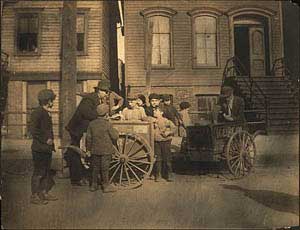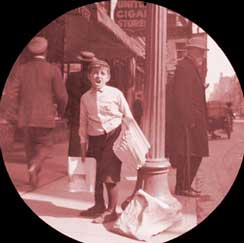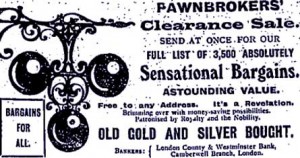◊ Saturday Night, the staunch Canadian magazine, did us a service by preserving in prose the naïve, native prejudicial stereotype of the day. This article from 1904 paints a disgustingly dark portrait of the ugly foreigner, particularly the Jew, who was then collectively making Toronto a cosmopolitan city for the first time. Anti-semitic in its purest form, this article paints a quaint portrait of Jews — Jewish children — as dishonest, avaricious, malodorous and misanthropic.
From Saturday Night magazine, December 3, 1904
 Man is, of his nature, a gregarious animal, gregarious within the tribe as within the guild or the coterie. Even the hobo pathetic has within his nomadic soul a fitful germ of gregariousness; unwashed, he winces at the sight of the cleanly and the spirit of comradeship only kindles in his bowels when he meets a fellow plodder grimy with the accumulated dirt of many moons.
Man is, of his nature, a gregarious animal, gregarious within the tribe as within the guild or the coterie. Even the hobo pathetic has within his nomadic soul a fitful germ of gregariousness; unwashed, he winces at the sight of the cleanly and the spirit of comradeship only kindles in his bowels when he meets a fellow plodder grimy with the accumulated dirt of many moons.
Within the tribe, no man is more gregarious than the Jew, and every capital or city of the world can show its ghetto. Toronto, too, possesses its ghetto, and if you will study the Toronto Jew in puris you must visit him in the tumbledowndom of York street. He has it is true, mapped out other ghettos in Toronto — in Elizabeth, for instance, and in Centre avenue; but here Judaism is glazed with a modern tint. In York street he is almost as he was in Petticoat Lane, only without the unblushing dishonesty of the inhabitant of that departed by-way — in its day to the Whitechapel Jew what the Appian Way may have been to the purple-robed patrician. It may be an overworn joke to impatient ears that the well-dressed London sightseer could at one time enter the eastern extremity of Petticoat Lane and by the time he reached the other end see the silk handkerchief which he thought safe in his pocket priced and hanging out for sale at a dealer’s.
The ghetto of York street differs not a whit from those of Paris, Berlin or Frankfurt or London. You can, without being an ethnologist, classify them with a little practice — the Hungarian Jew, the Polish, and the Russian. If a stranger, you are first struck with the difference in type, of the children from other children, with their pushful little noses and their black hawk-eyes. Some of them have faces such as Del Sarte would have loved to pain, curly-headed, pink-tinted, even-toothed. And yet there is something lacking — you will find it lacking in the eye. There is a hardness in it that is foreign to the Christian child; before it has wrestled with its first pair of breeches, the Jewling’s eye has learned to speculate on values and has sacrificed in the process its trustful charm.
 There is such a little boy – – he may be a seven-yearling — who sells dailies at the corner of a newspaper office in Yonge street, and has many times come under the observation of the scribe. He might have served for the babe in the Ansidei Madonna, although he owns the wickedest little face in Ontario. When you ask him for a paper, he makes sure you have the cent, which he will take and pocket before he hands you your paper. The first he hands you will be an early edition, when you particularly want the latest; if you take it on trust, then the seraphic little imp has scored — he generally does; if, however, you find him out and insist on the latest, he will, after a big effort, ferret it out and lull you (the first time) into a belief in his integrity, with a puzzle in his eye as if the paper were to blame and who should: que diablo allait-il faire dans cette galore?
There is such a little boy – – he may be a seven-yearling — who sells dailies at the corner of a newspaper office in Yonge street, and has many times come under the observation of the scribe. He might have served for the babe in the Ansidei Madonna, although he owns the wickedest little face in Ontario. When you ask him for a paper, he makes sure you have the cent, which he will take and pocket before he hands you your paper. The first he hands you will be an early edition, when you particularly want the latest; if you take it on trust, then the seraphic little imp has scored — he generally does; if, however, you find him out and insist on the latest, he will, after a big effort, ferret it out and lull you (the first time) into a belief in his integrity, with a puzzle in his eye as if the paper were to blame and who should: que diablo allait-il faire dans cette galore?
This same seraph has more than once endeavored to trade the scribe a Monday’s paper on a Tuesday afternoon. Verily, the germ of a millionaire, a coming man for Wall street, Lombard street, or the Broad Walk in Johannesburg. The business instinct is rampant in these little children. go, for instance, if you are not squeamish and love the pungency of garlic, to a certain milk-shop in York street. A little girl will serve you with a glass of H20 plus milk and you tender her a dime, drink your drink and watch her with her beady eye upon your face. “How much do you charge for your milk?” you ask with some surprise as she fails to give you the change. “I thought you might take anoder glass,” she answers — and gets your change. Business, you see, again.
Here, however, is a business proposition of more mature growth. She is a greasy, olive-colored Jewess, broad of hip and big of bosom, as she lolls against her door-frame. Three urchins of the newsboy type are speculating on the price of a motley collection of old watches — weak-looking gold, sickly-hued silver and baser metal — lining the edge of the grimy window, crammed with time-worn jewelry, second-hand firearms, third-hand leather ware, relics of old lace, rust-red edge-tools, and that ineffable jumble of curios that marks the second=hand — second-hand, forsooth! — dealers, all the world across. Three urchins of the newsboy type do not constitute good business; they are in her window’s way, and, like the dying poet, she wants more light. She turns on them crossly:
“If you vant to buy a vatch, vel buy a watch; but if you vill not buy a vatch, vel go ‘vay from my vindow.”
 Inside in her emporium she has a kit-bag for sale; it is of excellent leather and indubitable Piccadilly Circus make. There is a tragedy connected with that kit-bag; you know it, for only an Englishman of good taste and certain means would buy such a bag. You look at it again. How much? “Sixteen dollar, sir” — the “sir” being evidently a concession to her commercial instincts; “it is from your country.” The cosmopolitan in you is piqued. “How do you know it is from my country?” you inquire.
Inside in her emporium she has a kit-bag for sale; it is of excellent leather and indubitable Piccadilly Circus make. There is a tragedy connected with that kit-bag; you know it, for only an Englishman of good taste and certain means would buy such a bag. You look at it again. How much? “Sixteen dollar, sir” — the “sir” being evidently a concession to her commercial instincts; “it is from your country.” The cosmopolitan in you is piqued. “How do you know it is from my country?” you inquire.
“Oh,” she answers with that flicker of a half-smile your true Jew vouchsafes to a Christian, “English — dey are all de same. De young gentleman who sell me dat bag, he stop vun month at de big hotel; he come once to sell me a silver vatch; den he comes very drunk to sell me two pair of boots; den he come and sell de bag and say he go to verk on a farm in de Vest. Dem shoots of clothes dere is English, de revolvers also. Ah, de young men von your contray is my best gustomers.”
Tragedy, if you will, of a kind. But inspect them all — these dowdy bazars of tumbledowndom: there is good stuff in all of them; mothers may have wept silent tears on them as they packed them for the family exile; sisters may have worked on them with nimble fingers for the poor “hard case,” that reckless ephemeron who dies with the sundown, but lives with us for ever; none but the thoughtless immigrant could have bought such things, and surely none but him could dare barter them in such unhallowed spots.
Toronto has no anti-Semitic germ in its entrails. In its by no means large population it holds some 7,000 Jews — nearly one Jew to every twenty Christians. And yet your York street or Centre avenue Jew loves not his Christian neighbor any more than your Whitechapel Jew loves the Londoner born; he only treats him with an equinamity less artificial. Strange as it may seem, the lower order of Jew has greater respect, if less love, for the Christian who displays symptoms of anti-Semitism than he has for the Christian who shows too much desire to receive him into the bonds of familiarity and fellowship. Approach a Jew with anything like reckless familiarity and he repels its least approach; he will not return your smile nor pass the time of day; not, indeed, unless you sport a pair of golden eye-teeth. Then, sir, you become an object of interest and speculation. In Toronto he has, indeed, thriven. He has four Jewish churches, including a church for Russian Jews in Richmond street west, to say nothing of a mission which wants “to bring him back to Light!”
Toronto, too, has the Italian. He, too, is of the gregarious, gregarious. In the Ward, to the rear of the City Hall, without Italian you fare almost as badly as you would in Montreal, in the poorer districts, without French. See them lolling in the Sunday sun, on their doorsteps, and you need not ask to go to Naples to surrender the ghost. The macaroni man is, indeed, wanting, but the men are verily the lazzaroni of the South. There is a glint in the eyes of them that recalls the ransom-loving Calabrian, the bandit who spills blood with what is termed “a fiendish gusto.” And this expression reminds one of a tale that certainly is worth retailing. It was in an English village and the local guide, who happened likewise to be the local liar, was showing a party of strangers round the place. He showed them the historic oak where King Charles never hid; the historic parish pump which never caused the great revolution in local politics; the historic church which didn’t date back to the Conquest; and finally he rang the ancient curfew bell which was dated A.D. 1898 and was made in Sheffield.
“But,” objected the spokesman of the party, “you haven’t shown us any murder-spots. Why, in the last village we were at, the local guide showed us a murder spot where a man had murdered his sweetheart and her four sisters with a fiendish gusto.”
“Quite true,” answered the guide, “but are you aware that when that murderer fled from the village, it was to this place he fled, and you are now standing on the exact spot where he threw away his fiendish gusto — all covered with blood.”
But the Italians of the Ward are mostly a peaceful and law-abiding lot, not at all unamicable. The fresh importation is the worst proposition; he imports with him the stiletto and has a weakness for carrying it on his person. Personal statistics, gleaned on the spot, not easily to be verified, make the Italian population . . . a fluctuating number, including roadmakers, hucksters, fruiterers and all sorts. Of all, the peanut and the ice-cream man — the Dago — is most familiar. He is a strange, silent soul, this Dago, dispensing his wares with a quiet, consular dignity that vaguely suggests a polite poisoner. One, above all, is the little Dago that dispenses ice-cream to thirsting urchins in the early forenoon, day in, day out, on Adelaide street. An irascible soul, he is the butt of the bold, bad boy, and oftentimes his victim. His stereotyped objurgation to naughty youths who try to simplesimon him is invariably:
“Hellsblaze, I slap you in de face — go ‘vay.”
He is very short and has that peculiar cast of countenance which is typical of him who, in the bright if irresponsible lexicon of the sea-tramping British mariner, is known as an “Italyander.” He wears the worried look that is born of years of harrying by irreverent whipper-snappers. Suspicion is the soul of his eye. If my Lord Grey were to sample his wares tomorrow, Dago would still be unhappy till he had pocketed his honorarium. He is active with his feet and the size of his boots is a holy terror to the too-familiar wight. He is a liberal education in Dagos.
These are but some of the best known of Toronto’s imports. There are others. Who knows not the Chinaman, that amiable soul with his bland smile and his gentle courtesy? When he first comes to Toronto he goes to the Mission Hall — Methodist, Presbyterian, Protestant, Catholic or Baptists — what you will. There is joy in heaven when the heathen from Cathay comes out of spiritual darkness. Here he plods his weary way through the Bible and learns to put an exotic brake on Scriptural patronymics like Hezekiah and Nebuchadnezzar. When he has croaked out the blessed word for several months, he comes to the conclusion that he knows enough English Bible to wash for the people of Toronto. He makes — and mark, herein he never fails — a costly present to his instructors and then he returns to Confucius for spiritual solace, and possibly enlightenment. ♦ — James Grant






